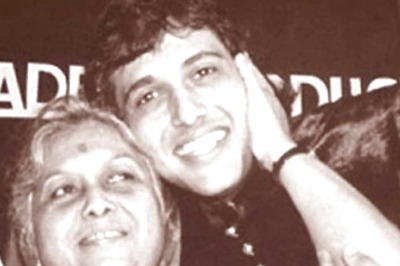
views
I have always been a train person. Airports and aeroplanes create artificial bubbles, where a dosa costs the same as caviar and a bottle of water comes at the price of high-end sparkling wine. Every passenger is a potential terrorist or drug mule carrying illicit contraband, and is treated with a weird mix of contempt and courteousness.
I’ve been made to take off my shoes, my cigarette packet has been emptied out, stick by stick, and once, on my first international flight, I had to disembowel my suitcase to extricate an alarm clock, which had a battery in it. At Heathrow, I’ve been made to dump my precious LPs – collected over two years – in a bin.
An aeroplane is also a claustrophobic space. Both passenger and crew are trapped at 33,000 feet with nothing but blankness outside. No wonder then that instances of passengers losing it mid-air and the high-handedness of cabin crew are not that infrequent. Flying takes a psychological toll.
It’s also true that flying is a wonderful experience. Few people forget the first time they were in an aeroplane. My first flight was when I was eight; I remember the air hostess coming with a tray of toffees and cotton wool (to stuff in one’s ears during take-off and landing) – a practice that has been discontinued.
Before the early 2000s, when Captain Gopinath’s Air Deccan arrived, few of us had boarded an aeroplane. Most Indians started flying relatively recently, at the turn of the century. Aviation was democratised by the coming of budget airlines, but this also irked the old entitled elite, the to-the-airplane-born.
I remember one such person complaining that “nowadays” all kinds of “riff raff” turn up at airports. In the 2000s, the aviation boom could be seen in the bylanes of small towns. In Dehradun, where I live, air hostess academies came up overnight. Smartly-dressed young women in clickety-clack heels and short skirts appeared in drab dusty streets, each with their own dreams and aspirations of a better life.
But behind the glamour, lies the dirty reality of the Indian passenger. As the recent incident on an international IndiGo flight shows us, it’s not easy being a member of the cabin crew. In the clip that has gone viral, a passenger flies off the handle over the contents of a meal, while the air hostess firmly puts him in his place.
While some might argue that the situation could have been handled better, there are times when the staff is left with no option but to fight fire with fire. There is only so much humiliation an overworked person can take. The question was not just about the rudeness of the finger-wagging passenger, but his presumption that the cabin crew should do his bidding because they were nothing more than his “servants”.
The feudal nature of Indian society was again laid bare. It’s a curious word – “servant” – which comes with its own baggage of privileged expectation. In other words, a servant in the Indian context is a slave who has been bought at an auction by the master. Servants are tortured and mistreated in our homes; the irate passenger on the IndiGo flight simply extended this perverse understanding of human relations to airline staff.
India is divided into two kinds of people: those who serve and those who think they were born to be served. It’s not just air hostesses who have to bear the brunt of cruel idiocy. I’ve seen this sort of appalling behaviour inflicted on auto-rickshaw drivers, waiters, delivery boys and security guards.
Casual violence, both verbal and physical, underlines this unjust power dynamic. The ground reality never alters, only the nomenclature does, a variety of impotent symbolism. Servants are not called servants anymore but “help”. Waiters and bearers are now called “servers”. An an air hostess is “cabin crew”.
Cabin crew members are only human. They keep difficult hours on long haul flights, and are expected to maintain a smiling front at all times. The facade of politeness and phony courteousness can never slip. A teacher or librarian or doctor or cashier doesn’t need to do it. One is allowed to be grumpy on a bad day.
There is also tremendous pressure on air hostesses to look a certain way – everything from your waistline, nails and hair are monitored by the employer. There is ageism too, with airlines preferring younger staff. Then there is the problem of the sexually frustrated Indian male. Strapped to his seat, he will lech, harass, make unreasonable demands. All of this will test the patience of the most experienced cabin crew members.
There is another point – about generations. It’s possible that 30 years ago, an air hostess would have bit her lip, swallowed her pride and taken the tongue lashing. The new Indian woman is not willing to take things lying down. She is willing to give it back. She will not be boxed into an antiquated notion of what constitutes “feminine behaviour”. As the IndiGo incident shows, there is also widespread public support for her actions. That, to me, was the most heartening aspect of this silly spat. The only comical aspect of it was the way we Indians argue. At some point in any tu tu, main main, both parties will say, ‘You shut up’. It’s as desi as ‘one tight slap’.
There is something curious about how Indians are generally well-behaved on trains. I’ve rarely seen such incidents on a Shatabdi or a Rajdhani. Maybe it has to do with how the deferential train bearer fits into our notion of a servant. He doesn’t challenge the status quo. Like a good serf, he expects a tip at the end. The one paying the tip can then make all kinds of demands.
Once on the Delhi-Mumbai Rajdhani, I saw a family send off an entire chicken to be cooked in the pantry, especially for them. Perhaps, the man on the IndiGo flight, if he was so finicky about his food, should have smuggled in a couple of live chickens in his hand luggage, and got them custom grilled in the tandoor in the cockpit.
(The writer is the author of ‘The Butterfly Generation: A Personal Journey into the Passions and Follies of India’s Technicolor Youth’, and the editor of ‘House Spirit: Drinking in India’. Views expressed are personal)
Read all the Latest Opinions here



















Comments
0 comment